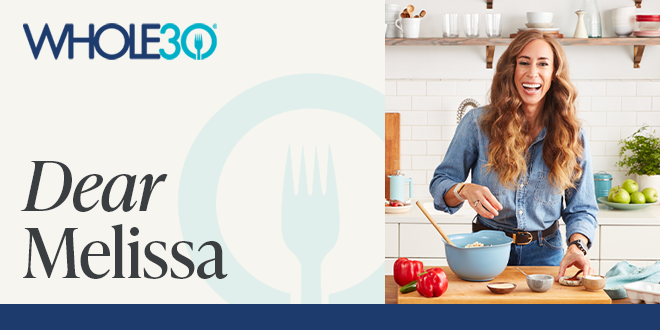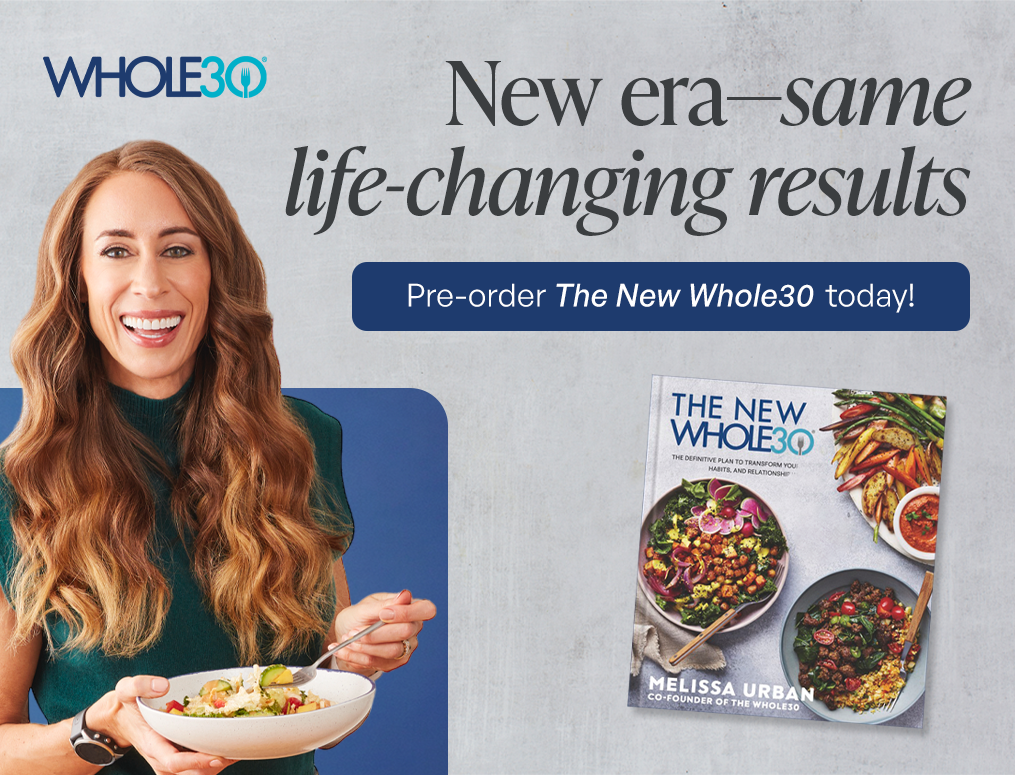Dear Melissa, I’m about to start Round 2 of my Whole30. Any suggestions on how to tweak it for weight loss? Maybe cutting out nut butters ? Intermittent fasting? Avoiding carbs from fruit and potatoes? Can you help? -Marie, on Twitter
Dear Marie,
My short answer (said with love) is no, I can’t in good conscience help you tweak the Whole30 for weight loss. First, because the Whole30 was not designed as a weight loss program. Second, because it won’t work the way you think it will. You’re asking me to shove a square peg into a round hole, and that’s not going to give you good Whole30 or weight loss results.
However, you deserve the longer version—which does actually include a few tips—so here you go.
Have more questions about Whole30 and weight loss? You’re not alone. Click here to see our Whole30 weight loss hub.
Focusing on weight loss can compromise your results
As an elimination and reintroduction program, the Whole30 has three very specific purposes:
- Identify hidden food sensitivities that may be contributing to negative health effects
- Create new habits and tools to navigate stress, discomfort, and negative emotions
- Restore a healthy relationship with food and reconnecting you with your body
Trying to tweak the Whole30 to do something it wasn’t designed for will likely come with negative consequences. To be more specific, you definitely won’t get life-changing Whole30 results, and you likely won’t get healthy, sustainable weight loss results either.
In order to lose weight on the Whole30, you’d have to apply weight loss principles, which primarily involve deliberate caloric restriction to put you in a caloric deficit. That means you’ll have to count calories, track your food and macros, and specifically tune out the signals your body is sending you, like “I’m hungry.” That flies in the face of our third goal, restoring a healthy relationship with food and reconnecting you with your body. You can’t listen to your body and honor the signals it sends you if you are purposefully eating fewer calories than your body needs.
In addition, weighing, measuring, and tracking your food often leads to a dysfunctional relationship with food, and your body. The numbers (combined with diet culture) have convinced us that eating less is good—and eating even less than that is surely better. I know very few people with a healthy relationship to calorie counting, and even fewer who can maintain a healthy mindset and body image while actively weight loss dieting.
When it comes to your Whole30 Non-Scale Victories (NSVs), this approach also tosses those aside for the sake of quick weight loss. Because your only goal is weight loss, you’ll be hyper-focused on the scale. You won’t be paying attention to whether the program is helping your energy, sleep, digestion, cravings, mood, or other symptoms—you’ll only notice whether or not you’ve lost weight. (There is a reason one of the Whole30 program rules says, “No weighing yourself during the 30-day elimination period.”) And those life-changing Whole30 benefits simply won’t materialize if you’re under-fed. In fact, your energy, sleep, mood, and focus might get worse on the program, because of your commitment to caloric restriction.
Your body comp won’t benefit either
You’ll discover there’s an equally negative impact on your body composition goal, too. What you’re doing here is essentially turning the Whole30 into every other quick-fix, unsustainable weight loss diet—and how well have those worked for you in the past? You could tweak the Whole30 for weight loss by:
- Restricting calories or portions
- Restricting macronutrients (like carbs or fat) or additional food groups (like fruit or nuts)
- Adding to the rules (like “no snacking” or “exercising twice a day”)
- Doubling up with protocols like intermittent fasting
By doing this, however, you will both short-circuit the way the program is supposed to work and fail to achieve sustainable weight loss. Crash dieting for quick weight loss doesn’t allow you to create new healthy habits, stay connected to your body, or achieve sustainable results. In fact, a huge amount of scientific evidence tells us that quick-fix weight loss dieting does not promote lasting weight loss.
In this model, you’re also far less likely to follow a careful, thorough reintroduction period (the second half of the Whole30). This leaves you susceptible to falling back into old habits when your 30 days are over. Imagine eliminating foods you love for 30 straight days, being hungry the whole time, learning little from the experience, and falling right back into old habits once elimination is over?
That sounds like a lose-lose to me.
The Whole30 is different
I bet you came to the Whole30 because you wanted something different. The quick-fix weight loss diets you’ve done in the past didn’t make you healthier, lead to sustainable weight loss, or improve your relationship with food. You’re ready for a change. Let Whole30 be that change, without trying to shove it into the “diet” mold you’ve known (and loathed) for so many years.
Now, I did promise you some weight loss advice. The truth is, weight loss can be a natural byproduct of your Whole30, without tracking or purposefully restricting calories. You may lose weight naturally by eliminating alcohol, baked goods, soda, and other high-sugar foods. Weight loss can also occur when you replace bread, pasta, and cereal with vegetables and fruit. (It’s also common to lose some water weight here too.) By decreasing inflammation, you may notice a change in the way your clothes or rings fit. Improving your digestion can also make you feel and look less bloated.
In addition, the skills you learn on the whole have been proven to help with sustained weight loss. For example, according to the National Weight Control Registry (NWCR), people who plan their meals are 1.5 times more likely to maintain weight loss. By learning to read your labels, plan your meals, and cook a wider variety of foods at home, you are setting yourself up for a lifetime of healthy habits.
Finally, if the Whole30 does improve your energy, sleep, cravings, mood, pain, fatigue, or other symptoms (like it has for millions of people), think about the downstream effects! With more energy, you’ll be more motivated to go for walks, a yoga class, or other forms of exercise. With deeper sleep, you’ll reduce chronic stress—a big factor in body composition. With fewer cravings, you’ll be less likely to prowl through the pantry at 10 p.m. And with new healthy habits, you won’t always automatically reach for food or drink in times of stress or negative emotion, because you’ll have other tools for coping.
Your Whole30 elimination and reintroduction could prove the foundation for healthy, sustainable weight loss! The trick is not to pursue intentional weight loss on the Whole30. Use the program the way it was intended. Give yourself a well-deserved break from the scale. And after the program is over, if you so choose, you will be able to pursue that weight loss in a way that feels physically and mentally healthy.
Best in health,
Melissa
















